Open to Debate
Open gallery
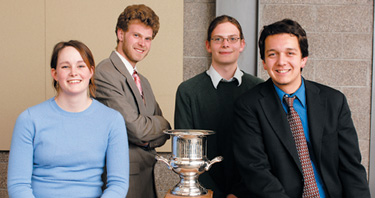
Welcome to the terrifying world of parliamentary debate, where time is your enemy, coffee and Pepto Bismol are your sustenance, and quick thinking and a broad knowledge base are your only hopes for survival.
In this type of debate, both the side of the issue you will debate (either the affirming “government” side or the opposition) and the issue itself (the “resolution”) are announced just minutes before the debate begins. Participants then have only 10 to 30 minutes to prepare their case.
For glossophobes (the 75 percent of humanity who fear public speaking), the prospect of being forced to speak publicly and persuasively with little or no preparation on an often obscure topic may seem like a nightmare. Death is often feared less. But students on the Lewis & Clark College forensics team do this for fun. Not only that, but they’re good at it. As in national-champions good.
In March, four Lewis & Clark students—two teams of two—took first and third place at the National Parliamentary Debate Association (NPDA) tournament in Lubbock, Texas—a feat that no other college has ever achieved. Earlier this year, the same two teams also were the first ever to take both first and second in the Hatfield Debates, “closing out” the top forensics competition in the Northwest.
“Our teams performed better than those of any college in the history of these events,” says Steve Hunt, professor of communication and director of forensics. “It was a spectacular year, and I’m very proud of these students.”
How did these four students—all from small towns, all representing a small liberal arts college—get so good? And some might ask: Why in the world would they want to?
When asked if they were willing to talk about it, as you might imagine, they were more than happy to oblige.
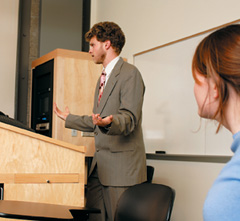
How—and why—do ordinary people become extraordinary debaters?
There appears to be no formula for how people get into debate—some are drawn to it by their love of speaking, some by their fear of it, and some just fall into it accidentally. But once they do get into it, some common themes emerge among the top talents.
Paul “I was a very shy and timid person when I started high school,” says Paul Bingham ’05, “but I’m not that person anymore.” Rather than run from his fear of public speaking, Paul faced it head-on by joining the Ashland High School forensics team. By the time he graduated, he was looking only at colleges with quality debate programs. “The opportunity to debate on a strong college team was probably the largest determining factor in my choice of Lewis & Clark,” he says.
In addition to the confidence debate has given him, he thrives on the intellectual development it sparks. “I’m forced to be up on everything from current events to the philosophical underpinnings of modern political thought and critical social theory,” he says. “On the intellectual side, I have yet to find anything that even comes close to being as rewarding as debate.” The formerly shy student was president of Lewis & Clark’s forensics team in 2004-05. He and his debate partner, Meredith Price ’07, are the first-place 2005 NPDA champions.
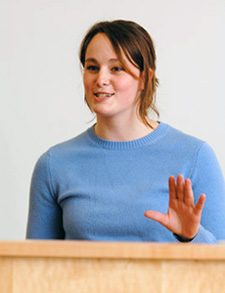
“In debate, you have to be prepared and be able to think on your feet, which has really helped my academic performance,” says Meredith. Although she is on a winning streak, she also appreciates the lessons she has learned from losing. “Hearing constructive criticism helps me to build as an individual and work to do better the next time around.”
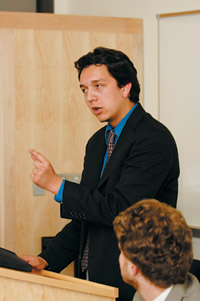
As a high school sophomore, Landon became the first student on his forensics team to go to state. This March, he and his debate partner, Mitch Stromberg ’05, claimed third place at the NPDA tournament. He credits his debate experience with helping him build the confidence to speak comfortably in front of groups of any size— something he was called on to do frequently during his senior year as president of the Associated Students of Lewis & Clark (ASLC).
“My confidence, my classroom performance, my critical thinking, my very best friendships—I can’t think of a single aspect of my college experience that debate hasn’t made better,” says Landon.
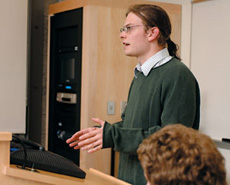
“I love the competitive aspects,” says Mitch. “I love argumentation–the logic of it, analyzing it, assessing it, being forced to come up with rebuttal claims, the strategy involved. It’s all heavy on critical thinking, and it’s just a really fun process. In addition, I like the community that evolves around it–I’ve made great friendships through forensics. It’s become one of the defining experiences I’ve had at Lewis & Clark.” You have to hand it to those debaters— they are persuasive. Listening to them argue the case for the intellectual challenges and rewards of forensic competition could make even the worst glossophobe begin to understand the appeal. But what is it like to actually participate in parliamentary debate?
How do you debate a topic like “Nero’s encore deserves a response”? What does that even mean?
“That’s what I love about debate,” says Paul. “The resolution can mean many different things—it’s very free and open.” Most often in parliamentary debate, the resolution relates to current events; teams prepare by reading the news voraciously and writing briefs on potential topics. “But sometimes you get thrown a curve ball,” says Paul, “and you just have to go in and think creatively.”
Paul and Meredith faced the “Nero’s encore” resolution in the semifinal round of the national tournament. “That was a really tough round, because Paul and I were on the opposition,” says Meredith, “so we had no idea what our opponents, a team from South Carolina, were going to lead with. Since it was metaphorical, they could talk about almost anything.” Taking their best guess, Paul and Meredith prepared arguments for a possible Nigeria angle. Their opponents, however, chose to run with the genocide in Darfur, comparing the lack of action on the part of Sudan’s current leader with that of the ancient Roman emperor Nero, who allegedly played the fiddle while Rome burned.
“The other team argued for supporting a European Union rapid-response force intervention in Darfur,” says Meredith. “Paul and I just looked at each other like, what are we going to do? And I thought, OK, this is where the international affairs major is going to help me again. Let’s just argue that the United Nations would be better for intervening and go hard-core U.N. legitimacy.” Paul was on his fourth pot of coffee that day and Meredith was chugging Pepto Bismol to calm her churning stomach, but the strategy worked. She and Paul won the round and proceeded undefeated to the finals.
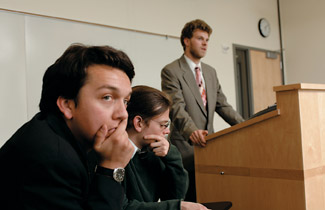
How does a Lewis & Clark education contribute to success in debate, and vice versa?
“A liberal arts education provides an advantage in debate,” says Paul, “because it’s multidisciplinary—we’re drawing from classes in astronomy, history, international affairs, constitutional law—and because the general approach promotes a flexible mind, which is absolutely critical for debate.” Just as Meredith’s international affairs knowledge helped her argue the case for U.N. intervention in Sudan, each of this year’s champions can point to specific classes that have helped them win debates. “Everything I learn in class, I take to my debates,” says Paul. “And all the skills I take from debate —from research skills to feeling comfortable talking with my professors—help me out in class. The academic and debate worlds are mutually reinforcing.”
In terms of their competitive success, say the students, excellent coaching and strong administrative support also play vital roles. “We didn’t win alone,” says Meredith. “Steve Hunt has been dedicated to Lewis & Clark’s forensics program for more than 30 years; he has been building up to this sort of a performance his entire coaching career.”
Indeed, the Lewis & Clark forensics team has ranked among the nation’s top college and university teams for more than 50 years. In five of the last 20 years, the College has been ranked first in the Northwest by the National Cross-Examination Debate Association. ”We have a very good record, and it’s because we attract talented liberal arts students, and because the administration has been very supportive of the program,” says Hunt.
As an educator, however, he points out that it’s not all about winning—it’s about what the students learn and how they grow from the experience. “Our main purpose is to help people be better critical thinkers, good researchers, good advocates, ethical competitors, good citizens, and self confident adults,” says Hunt. “Those are the long-term effects that are going to help them later when they become judges and lawyers and ministers and professors and senators and representatives.”
What happens to debaters after college?
Meredith plans to continue on the forensics team through her last two years at Lewis & Clark, and hopes to go to law school after that. “That’s a really common theme among debaters,” she says. ”Everyone wants to go to law school.” Specifically, Meredith hopes to get into litigation, where her debate strengths will serve her well.
True to theme, Paul and Mitch also are working toward careers in law. Paul plans to coach debate at a university for a year or two before going to law school, where he will work toward his dream job of being an attorney for an international nongovernmental organization. Mitch will take the LSATs in October and plans to start law school the following year.
Landon is taking a different path. After the last few crazy years, he says, “I’m going to live a small, very quiet life in rural New Mexico.” Landon has accepted a two-year teaching commitment with Teach for America, a program that sends college graduates to teach in poor, disenfranchised parts of the country. While in New Mexico, he hopes to get involved in the political campaign for the state’s governor and presidential hopeful, Bill Richardson. The outgoing ASLC president may even have political aspirations of his own. “I think I have political aspirations in the way that a lot of people do: I’d like to make a very positive impact on this world,” says Landon. “Other than that, I’m open. Parliamentary debate has taught me to stay on my toes, and I’m more than willing to adapt my plan in life to follow my heart in whatever direction it leads me.”
Who can argue with that? In the debate on the merits of forensics in learning and life, these students, clearly, are winners.
by Ellisa Valo
Writing about debaters is the closest Ellisa Valo ever hopes to come to actually being one.
Photos by Robert Reynolds.
More L&C Magazine Stories
Lewis & Clark Magazine is located in McAfee on the Undergraduate Campus.
MSC: 19
email magazine@lclark.edu
voice 503-768-7970
fax 503-768-7969
The L&C Magazine staff welcomes letters and emails from readers about topics covered in the magazine. Correspondence must include your name and location and may be edited.
Lewis & Clark Magazine
Lewis & Clark
615 S. Palatine Hill Road MSC 19
Portland OR 97219

